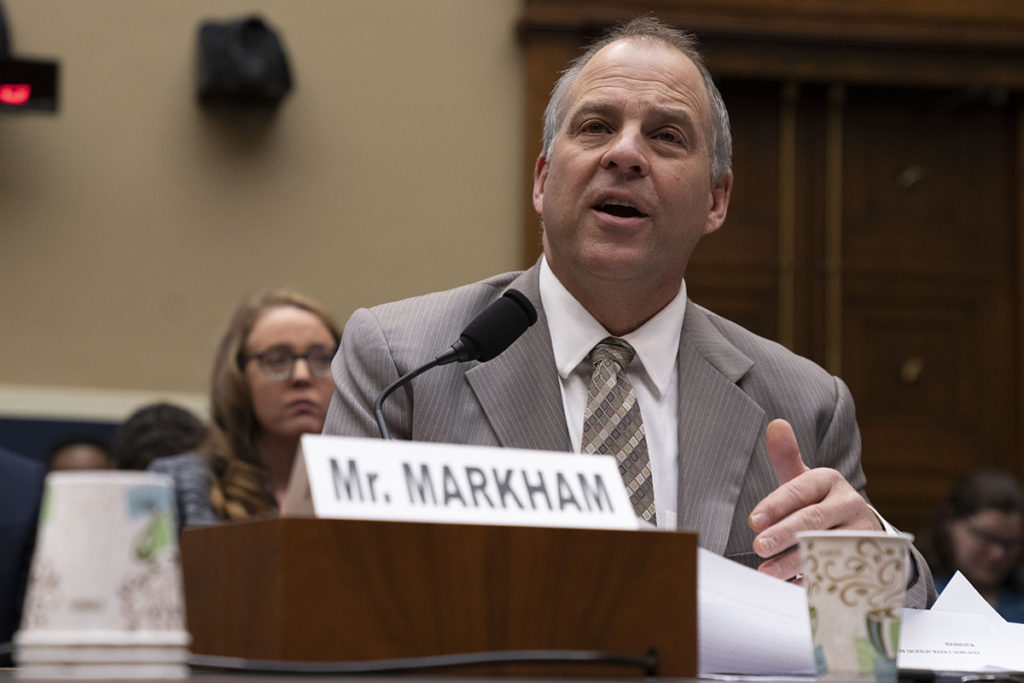
The risk of more wildfires in the West is heightened by government delays in allowing electric cooperatives to remove dead and dying trees from federal land near power lines, an Oregon co-op leader told a congressional committee Tuesday.
“Electric cooperatives, because of the commitment to the members we serve, work diligently to keep our rights of way cleared and transmission and distribution systems maintained,” said Dave Markham, president and CEO of Redmond-based Central Electric Cooperative. “However, it is the many things beyond our direct control that have impacted our ability to mitigate against wildfires—notably our proximity to federal lands.”
Central Electric’s 5,300-square-mile service territory is 56% federal land, Markham said in testimony before two subcommittees of the House Energy and Commerce Committee.
“This requires us to work closely with the U.S. Forest Service, Bureau of Land Management, Council on Environmental Quality, and other federal agencies,” he said. “While all parties are committed to protecting the nation’s electrical infrastructure and preventing wildfires, the pathway forward is still fraught with unnecessarily time-consuming regulatory processes. Months slip away before authorization or permits are issued to perform work otherwise routinely done in days.”
For example, Markham said, the co-op identified 30 dead and dying trees in February 2019 that needed to be trimmed or removed from federally managed land before the start of wildfire season.
“The request sat idle and garnered no response until I raised the issue with CEQ and BLM representatives during a trip to Washington, D.C., in the last week of April,” he said. “Shortly after my return, on May 6, 2019, the Notice to Proceed was issued. While three months passed before getting approval, it took only three days to remove the 30 dead and dying trees that posed a wildfire threat.”
That was not an isolated example, Markham said.
“Currently, Central Electric is seeking approval to replace 131 aging power poles and remove encroaching vegetation along a 13-mile overhead power line route in the Camp Sherman area,” he said. “The poles, initially installed in the 1940s, will be replaced with taller poles and longer cross arms to enhance reliability, resiliency, and reduce the risk of our infrastructure to wildfire ignitions.”
It has already taken more than eight months for the federal government to post a proposed action to solicit public input on the co-op’s plan, Markham said. Meanwhile, time is running out to complete the work before heavy winter snows fall.
“While sharing these stories helps to illustrate the practical challenges we face, my intention is not to come before you today and complain about the problems electric co-ops have encountered with the federal land agencies or denigrate the land management professionals,” Markham said. “They work hard with the resources they have available. I am here to discuss solutions and communicate where the federal government can lend assistance through support and improvement of certain policies and practices.”
Specifically, Oregon co-ops need the federal government’s support as they work with state, regional and district land management agencies to reach agreements on ways to reduce wildfire risks within utility corridors and adjacent lands, he said.
“To ensure these agreements endure leadership changes at the local level, it is critical they have the support of the U.S. Department of the Interior and the U.S. Department of Agriculture,” Markham said. “It would be a significant gesture of support for the secretaries of Interior and Agriculture to lend their signatures to these agreements.”
Erin Kelly is a staff writer at NRECA.